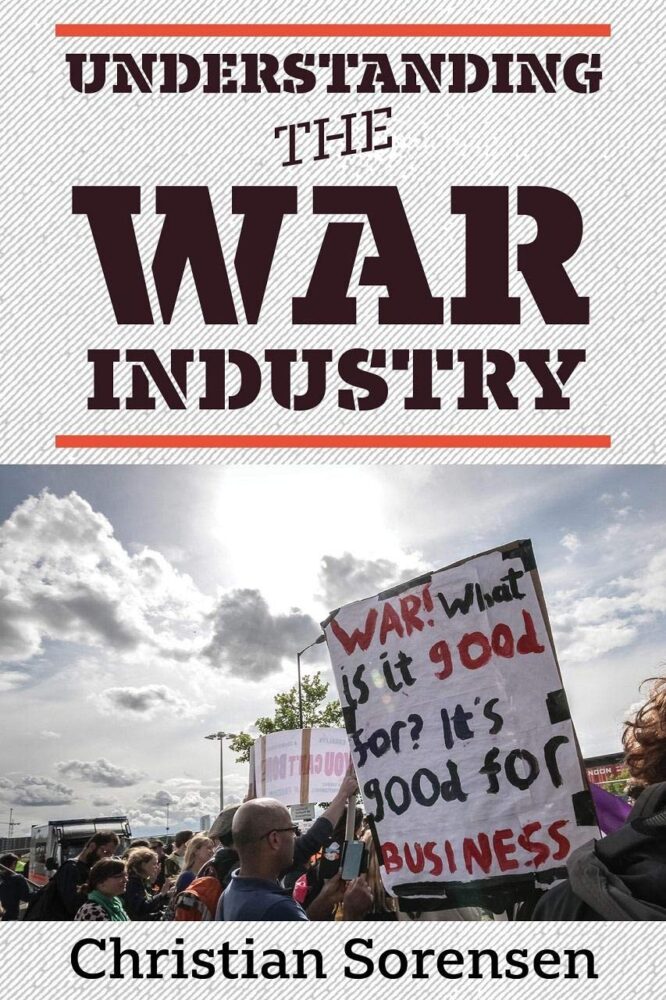Profit alone drives the war industry, leaving behind piles of corpses, writes Christian Sorensen. First in a series of five articles about the military industrial congressional complex.

Morgan Stanley building in Times Square, Manhattan. (Hanc Tomasz, CC BY-SA 3.0, Wikimedia Commons)
By Christian Sorensen
Special to Consortium News
 Capitalism — the economic system by which a relatively tiny group owns the machinery and factories and enriches itself through hoarding the workers’ surplus value, transforming the natural world into goods and services — is inherently destructive, exploitative, and polluting. The theoretical physicist Albert Einstein summarized the problem in the May 1949 issue of Monthly Review:
Capitalism — the economic system by which a relatively tiny group owns the machinery and factories and enriches itself through hoarding the workers’ surplus value, transforming the natural world into goods and services — is inherently destructive, exploitative, and polluting. The theoretical physicist Albert Einstein summarized the problem in the May 1949 issue of Monthly Review:
“Private capital tends to become concentrated in few hands, partly because of competition among the capitalists, and partly because technological development and the increasing division of labor encourage the formation of larger units of production at the expense of the smaller ones. The result of these developments is an oligarchy of private capital the enormous power of which cannot be effectively checked even by a democratically organized political society.
This is true since the members of legislative bodies are selected by political parties, largely financed or otherwise influenced by private capitalists who, for all practical purposes, separate the electorate from the legislature. The consequence is that the representatives of the people do not in fact sufficiently protect the interests of the underprivileged sections of the population.
Moreover, under existing conditions, private capitalists inevitably control, directly or indirectly, the main sources of information (press, radio, education). It is thus extremely difficult, and indeed in most cases quite impossible, for the individual citizen to come to objective conclusions and to make intelligent use of his political rights.”
This is the environment in which the war industry operates. The U.S. government serves corporate interest. And corporations, by design, strive to maximize profit. The profitable nature of war is what propels the military-industrial-congressional complex.
The military-industrial-congressional complex (MIC) is an insulated authority consisting of the U.S. military establishment, headquartered in the Pentagon; the war industry, the corporations that market and sell goods and services to the U.S. military, intelligence agencies, and allied capitalist regimes; and Capitol Hill, the elected representatives who fund the military and pass legislation abetting the permanent warfare state.
The U.S. financial industry, including investment banks, asset management firms, and private equity firms, sits at the top of the war industry. Investment banks and asset management firms hold the majority of shares in nearly every major war corporation. (The notable exceptions are Sierra Nevada Corporation and General Atomics, two private corporations run by billionaires: Fatih & Eren Ozmen and the Blue brothers, respectively.) The other way that U.S. finance dominates the war industry is by outright ownership of war corporations. This can be seen in the private equity firm Lindsay Goldberg’s ownership of the corporation Amentum, whose services include administering prepositioned matériel, maintaining military aircraft, and training helicopter pilots.
“Investment banks and asset management firms hold the majority of shares in nearly every major war corporation.”
The troops — the average soldier, sailor, airman and Marine — are not part of the MIC. From a military and congressional perspective, the troops are pawns deployed to help pry open countries to foreign investment, to ensure the free flow of natural resources and to threaten and implement violence against any government or group that resists Washington’s machinations. From an industry perspective, the troops are vessels to use the war industry’s goods and services and occupy the military bases through which industry routes further goods and services.

U.S. soldiers in Djibouti, Africa, for training. 2017. (U.S. Air Force, Erin Piazza)
The only uniformed military personnel who are part of the MIC are the high-ranking generals and admirals. The troops themselves enlist in the U.S. Armed Forces largely for economic reasons (though it can be comfortable for them to couch their participation in traditionally patriotic terms), as donning the military uniform offers one of the few well-paying jobs remaining in an economy that Wall Street and Washington have systematically gutted through the implementation of neoliberal economic policies.
Please Support Our Spring Fund Drive!
These policies decrease government monitoring and regulation of corporate activity; cut government spending on healthcare, education, and public infrastructure; export and automate jobs; and sell off such government assets and services as schools, transportation, and public utilities. Both capitalist political factions, the Republican and Democratic parties, abide by and promote such policies. The U.S. war industry thrives in Washington’s embrace of neoliberalism.
Calling themselves “defense contractors,” war corporations do more than design and pitch products. They also fabricate, test, evaluate, qualify, assemble, market, inspect, package, deliver, sustain, maintain, upgrade, monitor, and redesign products — all billable activities. Additionally, war corporations regularly bill their military customers for such services as configuration management, contractor logistics services, data, documentation, engineering, incidental materials, integration, logistics, management, operational security, parts, production costs, revitalization, spares, support equipment, technical services, and training.
To make more money, more and more goods and services must be conceived, marketed, and sold.

Boeing International Headquarters in Chicago. (Wikimedia)
Though headquartered inside the United States (typically a stone’s throw from Washington), U.S. war corporations have no loyalty to the nation. They are loyal to the almighty dollar, Euro, riyal, or any currency that comes their way. Currently, the major U.S. war corporations include:
- Lockheed Martin
- Raytheon Technologies
- Boeing “Defense, Space, and Security”
- General Dynamics
- Northrop Grumman
- L3Harris
- Leidos
- Huntington Ingalls
- SAIC
- AECOM
- Honeywell
- Booz Allen Hamilton
- CACI
- General Electric
- KBR
- Jacobs
These are the main players in profitable war. Although omitted from the rankings, some foreign corporations (e.g. London’s BAE Systems, Dublin’s Accenture, Rome’s Leonardo DRS, Ottawa’s Canadian Commercial Corporation) are deeply tied to the U.S. war industry and are therefore important to acknowledge.
‘Solutions’
War corporations market their goods and services as “solutions.” A Raytheon executive, John Harris, explained to the Defense & Aerospace Report in 2018 that engaging “with senior members of government” is just “providing solutions to our customers,” providing “integrated solutions to meet our customers’ needs,” and even “figuring out how we can solve our customers’ problems using a dispassionate system approach.”
The solutions trick works well when selling to the U.S. military. For example, Booz Allen Hamilton offers digital solutions, CACI offers information solutions, and Leidos offers innovative solutions. Through its inherently harmful, anti-democratic activities, the war industry helps create the miserable conditions for which it then offers “solutions,” of course without ever taking responsibility for the dismal state of affairs (i.e. nonstop war) that it helped create.
“Providing solutions” sounds prettier and more generous than “making money off death and destruction.” MIC officials also regularly couch Washington’s imperialism, weapon sales, and war-first foreign policy as giving the troops the “tools they need.” A similar phrase (“We’ve listened to the warfighter”) is utilized when selling goods and services, particularly upgrades and technological insertions.
Corporations regularly invoke “our troops.” Non-martial corporations are on the record exploiting the troops in advertisements for financial gain — for example, Budweiser is “proud to serve those who serve” and Fritos honors “our nation’s heroes” — but war corporations take it to another level.
For example, Navistar, which sells military vehicles, says it “builds the world’s best military vehicles because we care most for the people who drive them… No matter where our vehicles serve, our troops will never ride alone.” Another corporation, Peraton, even claims to “protect and promote freedom around the world.” These corporations flagrantly position themselves as benevolent or altruistic. Naturally, if war corporations truly cared about the troops, they wouldn’t lobby and push for policies that end up maiming and killing the troops (e.g., the 2003 invasion of Iraq, worldwide deployment of troops, and aggressive military posture).
War corporations use standard, industrywide schemes to maximize profit when contracting with the U.S. military. The first scheme is to underestimate the cost when pitching a product. Expenses accumulate, and the final product costs far more than initially estimated. Corporations underestimate cost and overestimate performance as a matter of routine. The second scheme involves incorporating regular upgrades of software and hardware into the product. That way, the war corporation remains involved indefinitely. Technicians service, maintain, and upgrade the product, all at great expense.
 The third scheme is pushing for noncompetitive contracts. When the Pentagon solicits proposals using an open, competitive bidding process, corporations compete to deliver decent services at cheaper prices. Noncompetitive contracts garner greater profits. Furthermore, many major contracts that are awarded through nominally open and free competition are not functionally open or free; only a handful of corporations have the technology and financial clout to place a legitimate bid. In order to obtain noncompetitive contracts, corporations masterfully exploit the Federal Acquisition Regulation (FAR), the rulebook that sets out the parameters by which the U.S. government can purchase goods and services.
The third scheme is pushing for noncompetitive contracts. When the Pentagon solicits proposals using an open, competitive bidding process, corporations compete to deliver decent services at cheaper prices. Noncompetitive contracts garner greater profits. Furthermore, many major contracts that are awarded through nominally open and free competition are not functionally open or free; only a handful of corporations have the technology and financial clout to place a legitimate bid. In order to obtain noncompetitive contracts, corporations masterfully exploit the Federal Acquisition Regulation (FAR), the rulebook that sets out the parameters by which the U.S. government can purchase goods and services.
The fourth scheme is piling additional modifications onto a supposedly straightforward contract. Years into a contract with a war corporation, a lone Pentagon official might step back and marvel at how the provision of a simple good has metastasized into a ballooning multiyear project that incorporates disparate services and a variety of funding sources.
The fifth and final scheme is the sale of consumables. Products produced by war corporations ought to be repaired. But many industry products are pushed as consumables instead of reparables. In other words: use it, discard it, and then buy a new product, instead of using it and repairing it.
In parallel, corporations require many goods sold as reparables to be regularly scheduled for repair, regardless of whether the good actually needs to be repaired at that point. Collectively, these schemes produce contract after contract caring for industry’s profits, not military need.
Secrecy is the MIC’s chainmail. Military and industry classify information (e.g. Confidential, Secret, Top Secret) in order to keep weapons systems secret but also to keep the public ignorant of government criminality, the scope of the surveillance state, the full costs of war, and fraud, waste and abuse. Classifying information prevents the public from understanding and acting against entrenched, costly militarism.
Funding It

Marillyn Hewson, CEO of Lockheed Martin, at White House meeting March 6, 2019. (White House, Joyce N. Boghosian)
The military-industrial-congressional complex is expensive. Brown University’s Costs of War project estimatesthat $6.4 trillion has been allocated to post-9-11 U.S. “homeland security” and wars in Iraq, Afghanistan, Pakistan and Syria through fiscal year 2020. William Hartung and Mandy Smithberger have calculated that roughly $1.25 trillion was spent in 2019 on war and sundry “national security” costs. It is estimated that less than an annual $300 billion could end world hunger, and roughly $240 billion could pay for primary and early secondary education for the world’s population.
Many corporations receiving money from the Pentagon (e.g. AECOM, Amazon, Honeywell, IBM) do not pay their fair share of taxes, according to the Center for Public Integrity and Fortune. The Institute on Taxation & Economic Policy issued a report in December 2019, which cited 91 U.S.-based corporations that did not pay any federal income taxes on their 2018 domestic income. This irresponsibility is part of a wider pattern wherein the ruling class shirks social responsibility: The richest 400 families in the U.S. paid a lower share of the tax burden in 2018 than any other income range, as Emmanuel Saez and Gabriel Zucman document in their 2019 book The Triumph of Injustice.
The tax burden falls on the working class. The working class in the United States pays higher taxes relative to the working class in other industrialized nations but is not granted the social safety net that usually comes with high taxation, as an analysis in Jacobin has demonstrated. And, of those taxes that workers pay, more tax dollars go to war corporations than the troops’ needs.
“Classifying information prevents the public from understanding and acting against entrenched, costly militarism.”
The U.S. government pays for industry’s goods and services with tax dollars and money raised from selling Treasury marketable securities. From this, the U.S. military has dozens of different funding buckets to pay for goods and services. Popular funds include working capital funds, operations & maintenance funds, procurement funds, and research, development, test, and evaluation funds.
The government has a long-standing policy that guides military units of all sizes to spend their budgets by the end of the fiscal year. If military units spend all of their money, they are typically allocated the same amount of money or more in the next budget appropriation. However, if they economize, find savings, or do more with less, they likely see their budgets cut in the next appropriation. This policy, often called “use it or lose it,” does not incentivize fiscal responsibility.
It gets worse. The Defense Finance & Accounting Service is the military’s primary financial management arm. A 2013 Reuters investigation by Scot Paltrow concluded that DFAS implements monthly “unsubstantiated change actions” — illegal, inaccurate “plugs” — that forcibly make the War Department’s books match Treasury’s books:
“Fudging the accounts with false entries is standard operating procedure… Reuters has found that the Pentagon is largely incapable of keeping track of its vast stores of weapons, ammunition and other supplies; thus it continues to spend money on new supplies it doesn’t need and on storing others long out of date. It has amassed a backlog of more than half a trillion dollars… [H]ow much of that money paid for actual goods and services delivered isn’t known.”
DFAS cooks the books, and the Pentagon’s high-ranking officers and civilian leaders are complicit. Since the public has no true idea of how much money the Pentagon is wasting, the Pentagon is able to ask Congress every year for more and more money, in brutal contempt of soldierly efficiency and military necessity.
In recent years, the Pentagon has hired Corporate America to audit its books. The U.S. military has yet to pass the audit. The audit is ongoing and quite costly.
The main role of the federal government under capitalism is to maintain the capitalist economic system and set the general conditions by which large corporations and billionaires are able to accrue more and more profit. The aforementioned military and congressional activities — substantial spending on the war industry’s goods and services, namely — demonstrate that the federal government is indeed fulfilling its main role under capitalism.
Federal departments are encouraged to allocate nearly one quarter of their procurement funds to small businesses. The U.S. military establishment dishes out more money to small businesses than any other government department or agency. All sides of the MIC are bound symbiotically in the small business game: The Pentagon fast-tracks contracts and militarizes greater portions of the economy, industry gets noncompetitive contracts, and Congress spouts “jobs” rhetoric, placating and misleading some within the working class.
Additionally, “small” businesses can be quite big, including corporations with over $100 million in contracts with the military or corporations with hundreds of employees. Corporations have been known to hold on to Small Business classification even though they are now larger than “small.” Awarding numerous contracts annually to small businesses, genuine or posers, militarizes the economy, further trapping the country in the costly permanent warfare state.
First in a five-part series by the author. On Wednesday, Part Two: Profits & Deception.
Christian Sorensen is an independent journalist mainly focused on war profiteering within the military-industrial complex. An Air Force veteran, he is the author of the recently published book, Understanding the War Industry. He is also a senior fellow at the Eisenhower Media Network (EMN), an organization of independent veteran military and national security experts. His work is available at War Industry Muster.
The views expressed are solely those of the author and may or may not reflect those of Consortium News.
Please Support Our
Spring Fund Drive!



is outthere anybody suggesting a feasible solution to the issue ? would be welcome by many
Excellent article and thoughtful comments!
So, in the end, after decades of articles and books about “why” each war of aggression took place, at the end it’s really all about the money – a con game, a game of three card monty an outright rape and pillage, wasting $trillions, leaving this country in shambles with respect to a sustainable, stable infrastructure, functioning health care system and the rest and shamefully misusing the people who serve.
Joe Biden will never be able to keep his promises on dealing with climate change, health care, infrastructure, jobs and the rest unless he brings those $trillions home…along with the million who have been caught up overseas in our military machine who should instead be part of a massive effort to shift to renewables and cope with climate change.
Ray Mc Govern’s MICIMATT also comes to mind – including “academia” – proven to me by the response I got to my email a coupla years ago to about 200 associates at the JFK School of Govt, chastising them for withdrawing Chelsea Manning’s Honorary Degree and speaking engagement for her having told us the truth about wrongdoing in our name, which got one response from an associate at that school:
A woman warned me about “National Security” and I replied that I thought it was instead Institutional Failure – a failure of the JFK School to do their jobs to bring foreign policy discussions to the general public. She challenged with – “you don’t understand that most people don’t think like you” and I responded with an lol saying – yeah that seems to be the case and I should have said – hope I said – well, it’s your fault that they’ve been flummoxed by you and the media and the rest of the war machine….
She also mentioned that part of her job is polling the public on these issues……I wondered who funded her “work”…..
It’s a horrific abuse of the people who serve – they should be brought home with the $trillions that are wasted killing people and stealing their natural resources and they should instead be offered training in rebuilding our energy system to one based on renewables.
I believe that the reason that nuclear is pushed as an alternative to oil/coal/gas is because it requires a. massive investment in a concentrated, centralized nuclear energy plant…so once again establishing a powerful oligopoly.
That’s why, IMO, a dispersed energy system where people or small groups of people control their own wind power/solar power keeps those corrupting oligarchs at bay….
Kept in the dark
Fed on bullshit and lies
The illusion of choice
Is something everybody buys
Cookie cutter candidates
Actors in a show
All of this is just a ploy
To maintain the status quo
They demonize a ghost
They fabricate a need
To strip you of your rights
So you’ll willingly concede
Then pound the drums
And wave the sword
Then they march you off to war
The fodder isn’t even sure
what he’s really dying for
In the end his life’s blood bought
some billionaire another yacht
This subject is dealt with very well in Frank Kofsky’s book “Harry S. Truman and the War Scare of 1948: A Successful Campaign to Deceive the Nation”.
A massive aircraft industry had built up during WWII but faced bankruptcy when the war ended. Demand for civilian aircraft was insufficient to maintain the industry and attempts to diversify failed because of a mindset that paid little regard to costs.
And so… “the Russians are coming” although the Truman administration knew that not to be the case.
Thanks 4 the much needed information n details. A bizarre n disturbing parallel to this is when u try to discuss this with your neighbors they immediately get angry n defensive,mainly about anyone questioning our forever wars but also about what they perceive as non support for our troops overseas (cannon fodder,not “wounded warriors” please). This explains ,imo,a great deal of why there is no longer a powerful anti-war (or better,a pro peace) movement as it seems the general populace has internalized the Mic’s endless propaganda.
Let’s keep in mind their latest tactic: placing CIA n other DOW (aka Dod) employees in Congress , a truly revolting act and if not actually legally unconstitutional,it’s certainly violates its spirit n essence. Remember the u.s. coup of 1963 n its follow up in 1968 thanks to these same organizations.
What’s the most crucial aspect to realize about the U.S. war industry is that it only goes in one direction, always. Never do the Washington-Zio military empire builders target Third World nation-states or other countries ruled by quisling potentates who throw their entire nations open to Western capitalist penetration and Wall St exploitation. Never does the imperium’s corporate mass media lackeys target these leaders with vilification campaigns and relentless demonization.
The war industry ONLY targets those leaders and nation-states that 1.) deign to control their domestic labor, resources, and wealth for the benefit of their people, or 2.) offer an independent model of govt that’s a “threat of a good example” to other poor and exploited peoples of the world, or 3.) gives diplomatic or material support to the beleaguered Palestinians and has the chutzpah to consistently call out Israeli aggression and sadism.
We can see from this information why the USA was not at all prepared for the real dangers much more likely to occur than any “attack” needing “defense” of a military kind. Plenty of storage of WMD and anything else expensive and dangerous, but no preparation for pandemics, economic meltdowns, climate change, infrastructure aging, and certainly no suggestion of trying to understand different points of view of those in other countries and compromising or at least realizing that threats, sanctions and war are NOT the only way to resolve differences.
Btw, the military n police couldn’t even successfully defend the Capitol on jan 6th or 9/11*, defeat a 3rd world poor country like Afghanistan while having a budget larger than the NEXT 10 COUNTRIES.
*the complete failure n “stand down” of every branch of our bloated military n “failure” to defend the world’s most highly defended building (the Pentagon with its personal missile defense) was a once-in-a-species event,n yet everyone involved got awards n career upgrades,not firings n shamings. Hmmm….
The MIC nexus is so well oiled it discourages real attempts reduce its power and influence. Particularly discouraging, say challenging, aspect is that there appears to be no promising movement to change.
What powerful institutions or groups have emerged to drastically reduce spending, even to create an effective fighting force if real threats emerge? How would it break through the seemingly impenetrable shield around it? Eisenhower at least acknowledged it, but it really didn’t change it. He made his famous statement on the way out.
There is the suspicion if real threats emerged the whole apparatus would have to be torn down and a new, more efficient an effective one created.
Thinking of equipment such as aircraft which now cost enormous amounts to produce, could we produce enough effective ones in a “real war”. Could we produce enough of any weapon system based on the costly methods caused by the need to maximize profits and inject dollars into states and congressional districts?
I’ve been saying (here and elsewhere) for several years now that the US military procurement grift is so rife with fraud, waste, and theft that if the US were to be so stupid as to initiate a conflict with a peer or a near-peer that that procurement system would collapse. Those (resistance) fighters who have learned to scavenge, improvise and cobble together an effective force might be better positioned against a uniformed army deprived of its high tech replacement parts. Of course, I truly hope we never have to find out how any of that might shake out, but the US powers-that-be are focused, relentless, and apparently, insane.
We’ll see if Mr. Sorensen addresses this premise.
Blunt and to the point. Take money from society trough propaganda and enrich a relative few. Looking forward to the following articles
A needed contribution to America’s understanding of how the war machine works and perpetuates itself. If only we had better media mechanisms to more broadly share this type of critical information with the broader public! I am looking forward to the followup series. Thank you for this coverage.
John Blumenstiel, Massachusetts Green-Rainbow Party